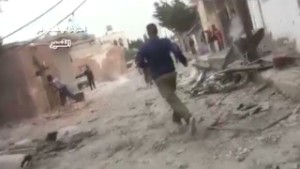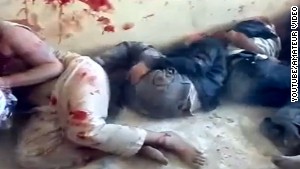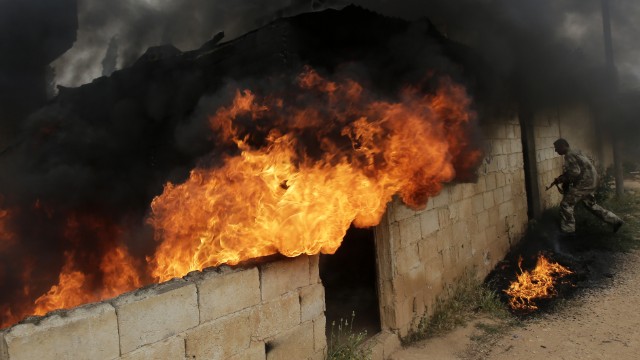Clashes between al-Assad supporters, opponents leave 16 dead in Lebanon
Fear of snipers kept
people indoors, reported Lebanon's state news agency said. The streets
were empty of cars, and schools and universities closed.
The fighting began Sunday, with the deadliest clashes taking place Wednesday night, Lebanon's state news agency said.
The clashing sides are
residents of the Bab-al-Tibbaneh neighborhood (dominated by Sunnis), and
the adjacent Jabal Mohsen neighborhood (which is dominated by
Alawites).
 Syrian forces pound rebel stronghold
Syrian forces pound rebel stronghold
 Al-Assad: I'll consider talks, but ...
Al-Assad: I'll consider talks, but ...
 Why are atrocities growing in Syria?
Why are atrocities growing in Syria?
Tripoli is home to both
Alawite and Sunni Muslims, and sectarian tensions have worsened in
recent months as the civil war in neighboring Syria rages on.
The Alawites support Syrian President Bashar al-Assad. The Sunnis want his ouster.
The Lebanese government
has remained officially neutral in the conflict -- even as it has
firmly, but quietly, supported al-Assad.
Analysts say the longer the Syrian conflict rages, the more destabilized Lebanon will become.
The Syrian connection
The major concern for
Lebanon is that Syria's troubles will reopen the wounds of Lebanon's
15-year-long civil war, which ended in 1990.
Aside from its southern
border with Israel, Lebanon is entirely surrounded by Syria, and was
considered part of "greater Syria" until the end of World War I.
It became an independent
country in 1943 but has been strongly influenced by Syria both
politically and militarily for much of the time since.
Syrian troops were
deployed in Lebanon between 1976 and 2005, primarily in the north --
ostensibly at first as peacekeepers to help stop Lebanon's long civil
war -- but maintained a significant presence long after the fighting
stopped in 1990.
This all changed in 2005 after former Prime Minister Rafik Hariri was killed by a car bomb in Beirut.
Anti-al-Assad elements
in Lebanon accused the Syrian government of being behind the attack, and
popular protests -- along with international pressure -- forced the
Syrian military to withdraw from the country.
Since then, Lebanon's
two most prominent political blocs have been sharply divided in their
attitude toward Syria: the ruling pro-Syria alliance and a group of
anti-Syrian factions led by Saad Hariri, son of the assassinated former
prime minister.
In addition, thousands of refugees have poured into Lebanon since the conflict in Syria began.
 Syrian army soldiers take control
of the village of Western Dumayna north of the rebel-held city of Qusayr
on Monday, May 13. Syrian troops captured three villages in Homs
province, allowing them to cut supply lines to rebels inside Qusayr
town, a military officer told AFP. Tensions in Syria first flared in
March 2011 during the onset of the Arab Spring, eventually escalating
into a civil war that still rages. This gallery contains the most
compelling images taken since the start of the conflict.
Syrian army soldiers take control
of the village of Western Dumayna north of the rebel-held city of Qusayr
on Monday, May 13. Syrian troops captured three villages in Homs
province, allowing them to cut supply lines to rebels inside Qusayr
town, a military officer told AFP. Tensions in Syria first flared in
March 2011 during the onset of the Arab Spring, eventually escalating
into a civil war that still rages. This gallery contains the most
compelling images taken since the start of the conflict.
No comments:
Post a Comment